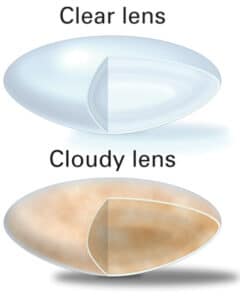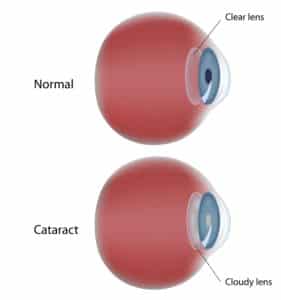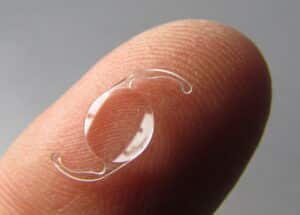The lens of your eye is an important structure. In order to see clearly at all distances (from up close to far away), your eye must be able to change its focus power. The lens of your eye is responsible for this change in focus—it changes its shape to bring whatever you’re looking at into clear focus. In your early 40’s, you lose the ability to see up close and require bifocals, or at least reading glasses. This is because, as we age, the lens hardens and cannot change its shape anymore, and in order to focus at different distances, more than one glasses prescription is required.


As we age even more, the lens becomes cloudy. This cloudiness of the lens is called a Cataract. Cataract is a common problem among aging Americans, and cataract surgery is the most common surgery performed on adults in the United States. In cataract surgery, the cloudy lens is removed. In order for you to see clearly afterward, a new lens (called an intraocular lens implant, or IOL) must be inserted at the time of surgery.

Your doctor will take measurements before your surgery to determine how strong your lens is, so an implant with the same strength can be put in during the surgery. If you wear glasses, the implant strength can be adjusted to replace both your lens and your glasses.
Like your aging lens, the implant cannot change its shape to help you see both up close and off at a distance. But several options are available to help you minimize—or even eliminate—your need for any type of glasses after cataract surgery.
DISTANCE CORRECTION: For instance, your doctor may place implants in your eyes with the appropriate strength for you to see well at a distance, and you can wear reading glasses when you want to see up close, such as for reading.
MONOVISION CORRECTION: Another option is for your doctor to select the implant strength for you to see distance clearly for one eye, and a different strength—the one for up close—for your other eye, so that you can see clearly at all distances without glasses after surgery. This is called monovision. This works well for some people, but other people have trouble with depth perception when their two eyes are focused at different distances. Therefore, this option is usually reserved for patients who have previously tried monovision successfully with contacts lenses or LASIK surgery prior to their cataract development.
ASTIGMATISM CORRECTION: Toric IOLs (or Astigmatism Correcting IOLs) are a great option for patients who have both cataracts and astigmatism and want to decrease their chance of needing glasses for distance after surgery. Not all patients with astigmatism are candidates for this type of implant, but if you have a certain threshold level of astigmatism, a Toric IOL can be a great choice for your implant. Dr. Jahnle and Dr. Krespan can let you know if you would benefit from this type of lens when they see you for your cataract evaluation.
MULTIFOCAL CORRECTION: Another group of IOLs called Multifocal IOLs use technology that can give you a full range of vision, giving you distance and intermediate vision as well as improved near vision. Dr. Krespan and Dr. Jahnle use two types of Multifocal lenses, the Alcon PanOptix Lens and the Johnson & Johnson Symfony Lens. Not all patients are good candidates for this type of lens, but if you are looking to decrease your dependency on glasses for both near and far vision, this lens could be a good fit for you.
Talk with your doctor about the various types of implants available, and their effects on your vision after surgery. You and your doctor will develop a plan that pairs you with the best type of implants for your eyes and your vision needs.


